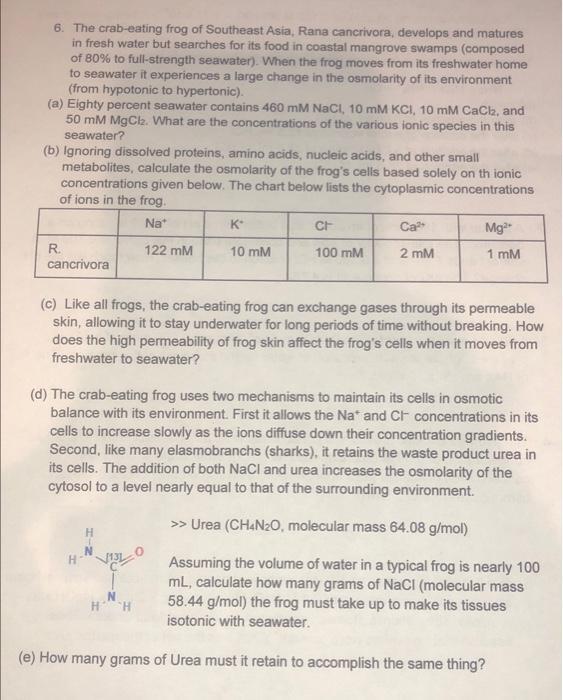Answered step by step
Verified Expert Solution
Question
1 Approved Answer
6. The crab-eating frog of Southeast Asia, Rana cancrivora, develops and matures in fresh water but searches for its food in coastal mangrove swamps

6. The crab-eating frog of Southeast Asia, Rana cancrivora, develops and matures in fresh water but searches for its food in coastal mangrove swamps (composed of 80% to full-strength seawater). When the frog moves from its freshwater home to seawater it experiences a large change in the osmolarity of its environment (from hypotonic to hypertonic). (a) Eighty percent seawater contains 460 mM NaCl, 10 mM KCI, 10 mM CaCl, and 50 mM MgCl. What are the concentrations of the various ionic species in this seawater? (b) Ignoring dissolved proteins, amino acids, nucleic acids, and other small metabolites, calculate the osmolarity of the frog's cells based solely on th ionic concentrations given below. The chart below lists the cytoplasmic concentrations of ions in the frog. Na R. cancrivora 122 mM HVIS K 10 mM H H CH 100 mM Ca 2 mM (c) Like all frogs, the crab-eating frog can exchange gases through its permeable skin, allowing it to stay underwater for long periods of time without breaking. How does the high permeability of frog skin affect the frog's cells when it moves from freshwater to seawater? Mg2+ 1 mM (d) The crab-eating frog uses two mechanisms to maintain its cells in osmotic balance with its environment. First it allows the Na* and CF concentrations in its cells to increase slowly as the ions diffuse down their concentration gradients. Second, like many elasmobranchs (sharks), it retains the waste product urea in its cells. The addition of both NaCl and urea increases the osmolarity of the cytosol to a level nearly equal to that of the surrounding environment. >> Urea (CH4NO, molecular mass 64.08 g/mol) Assuming the volume of water in a typical frog is nearly 100 mL, calculate how many grams of NaCl (molecular mass 58.44 g/mol) the frog must take up to make its tissues isotonic with seawater. (e) How many grams of Urea must it retain to accomplish the same thing?
Step by Step Solution
There are 3 Steps involved in it
Step: 1
Answer step 10 Tokal conch in sea water of Nall kul Call C fug cells are moves it...
Get Instant Access to Expert-Tailored Solutions
See step-by-step solutions with expert insights and AI powered tools for academic success
Step: 2

Step: 3

Ace Your Homework with AI
Get the answers you need in no time with our AI-driven, step-by-step assistance
Get Started


